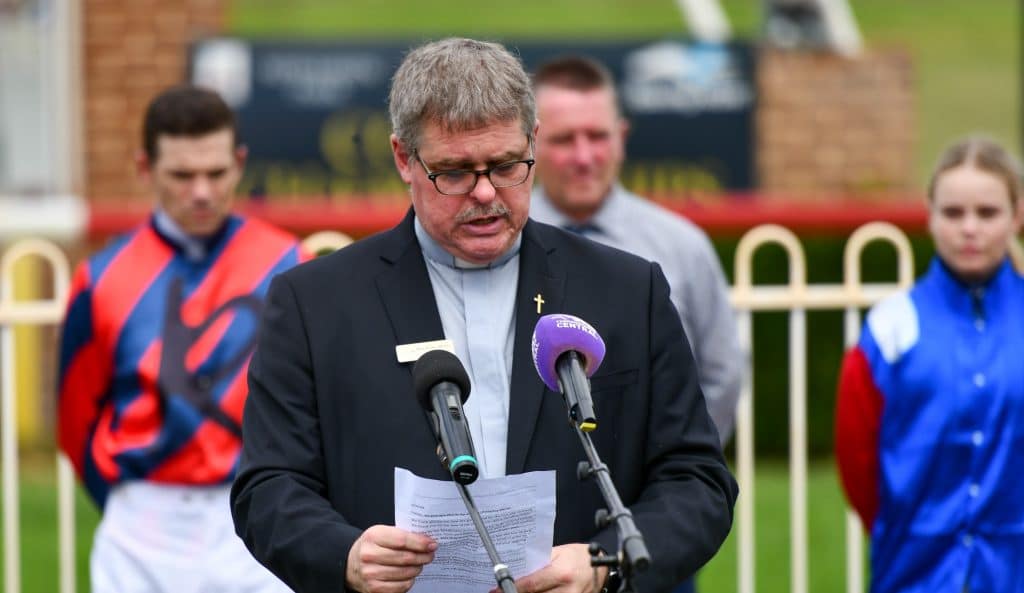
Jenan Taylor
22 October 2022
Sydney minister the Reverend Colin Watts goes to the races most days. He believes Anglican chaplains in Victoria should do the same.
A full-time pastoral care worker for Australian Racing Christian Chaplaincy, Mr Watts loves the jockeys’ billowing silks, the thunder of horses’ hooves, the spectators’ roar.
But he also knows that often that spectacle obscures the challenges that people in the racing community face.
In March the Victorian Racing Integrity Commissioner announced an independent review into the racing sector’s victim support and complaint processes.
It came after industry bodies called for an inquiry into how claims of sexual and physical abuse, assault and harassment had been handled in the industry.
Strappers, trainers, stable hands, breeders, and their families regularly faced tough times, but jockeys, especially, endured multiple hardships, Mr Watts said.
Each year of the 1000 or so jockeys throughout Australia, around 200 are injured, 40 per cent have a fall that might put them out of work for months, and on average one or two die.
Those statistics were the reason ambulances followed the riders around the track during racing, Mr Watts said.
Read more: Hospital chaplain’s care ministry in pandemic
Job instability, low pay, irregular hours that put pressure on relationships, the prevalence of bullying, and horse injuries and fatalities, were all things that weighed on them.
“The biggest mental strain is keeping the weight down. And then there’s the pressure of trying to get rides all the time. If people don’t think you’ve got a good ride, or if you don’t win, they won’t put you on,” Mr Watts said.
“It’s also very hard to get a good horse and you can’t win without a good one. It’s all performance based and it’s ride per ride per ride.”
Mr Watts and his ARCC colleagues attended 331 race meetings, 27 funerals or memorial services, and had more than 1000 pastoral conversations and interactions from 1 July 2021 to 31 May 2022.
They work at racecourses around most of the nation, except for Victoria and South Australia.
Even though Mr Watts has been trying to engage chaplains in Melbourne for some time, he’s had little success.
Concerns about the industry’s gambling association may well play a role in that reluctance, he believes.
But Mr Watts, who has been a pastoral carer at racetracks since 2009, said he has not had any gambling-related cases.
The work was more about building connections than reacting to incidents, he said.
However, doing that by phone, because of distance or because of restrictions like those imposed during COVID, usually complicated things.
“The ideal is to be person to person. That’s the whole point of chaplaincy in general, to be a presence,” Mr Watts said.
Read more: Collingwood minister’s army chaplaincy work recognised
Catholic priest, and former interim racing chaplain Father Kevin Dillon, said the Catholic perspective was that racing was a high-risk area where injury and death happened regularly.
Mr Dillon said his family had always had strong social justice connections to the industry, and his brother had been a long-standing racetrack chaplain in Victoria until his recent retirement.
Every year the Catholic church held a service to remember fallen jockeys, and a service for the whole sector on the Sunday before Melbourne Cup. While both were specifically Catholic, many people in the industry attended, he said.
Indeed for many jockeys and their families, their faith was tremendously important because of the high-risk situation.
“Having a chaplain has been an important component of the racing community for years. They are a point of connection, which is important for the people to whom chaplaincy is directed,” Mr Dillon said.
Still, he said society was not as religious as it used to be, and that the number of people looking for chaplains had diminished.
He said it was hard to get a true picture of the current need for chaplaincy, without doing a comprehensive survey of the sector.
If one was ever done, it should also define what was meant by chaplaincy, whether spirituality and faith, or social welfare and mental health care, in order to discern what out of those elements people actually wanted supported, Mr Dillon said.
But it should also include the punters because without them there would be no industry. So any such work would also have to explore the inequities that the gambling aspect of racing produced, he said.
“Because we live in such a fractious, ugly world, where a jockey might find himself being abused by a punter who’s lost a lot of money on a horse, and he didn’t believe the jockey raced it well enough,” Mr Dillon said.
Victorian Jockeys Association chief executive officer Matthew Hyland said the Victorian industry’s one chaplain who was Catholic, had always been well received.
However, Mr Hyland said that the jockey body also had an independent welfare officer, and an assistance program which gave riders access to 40 to 50 psychologists around the state.
He also said the broader sector had a helpline for industry participants.
The jockey association was comfortable with what support networks it had in place and the assistance program was well regarded, Mr Hyland said.
Mr Watts said that Victoria’s Catholic chaplain did an excellent job, but that the racing community was big.
He said he was seeking to build a network of chaplains in Melbourne and throughout the state, rather than relying on one person.
The racing industry operated in Victoria every day throughout the year, not just around Spring Carnival time, and he wanted chaplains to be able to be called on and available at any time.
“I want them to be at the races, to be at the trackwork, to go out in the early mornings, and get to know the people, rather than just wait for things to happen to respond to them. I want them to be around for things that could happen before they got out of hand,” Mr Watts said.
For more faith news, follow The Melbourne Anglican on Facebook, Twitter, or subscribe to our weekly emails.






